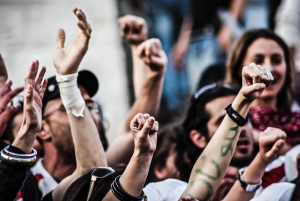Remember Pussy Riot? This unorthodox but legitimate denunciation of Putin’s politics by a punk group of Russian women in a Moscow Cathedral a couple of years ago would be penalised in Madrid, as of this week.
Following the growing global trend towards authoritarianism in governments’ treatment of dissent, often accompanied by vaguely worded laws, the Spanish government has implemented the so called “Gag law” adopted by Parliament in March. The Law had not a single vote in favour from members of the opposition.
The “Gag law” (or Law of “Citizens’ Security”) ignores basic human rights standards of free expression and peaceful assembly, failing to secure the right of citizens to protest, and shielding public officials and law enforcement officers from much needed public scrutiny.
Under the new law, journalists and members of the public who film law enforcement officers, or use such images, risk penalties of up to 30,000 euros. Make no mistake, this is a clear message: not only has police brutality not been properly addressed by the successive governments in Spain, no matter what party has been in power, but exposing those brutalities to the public opinion will now be punished, and harshly.
Fines of up to 600 euros for failing to notify authorities about demonstrations in public areas have been made possible, even peaceful protests. Once approved, marches that deviate from pre-approved itineraries could face fines of up to 600 euros.
The fines climb to 30,000 euros for protests that result in “serious disturbances of public safety” near parliament and Spain’s regional government buildings. Unauthorised protests that take place near key infrastructure, such as transportation hubs, nuclear power plants, refineries and telecommunications installations could result in fines of up to 600,000 euros.
Protests in Spain have been one of the main channels for expression of dissent and dissatisfaction with the consequences of the economic crisis. Legitimate, non-violent, direct action against eviction from homes, to allow banks to repossess, has been an expression of people’s solidarity at the neighbourhood level. It is symbolic that Ada Colau, the former leader of those citizens’ platform against evictions is now, by popular mandate, the Mayor of Barcelona.
Think for a moment: the massive demonstrations which followed the 11 March attacks in Madrid and across the country in 2004 would, under the new law, be penalised as they were not communicated in advance, demonstrating not only the unfairness, but the absurdity of the new law.
Civil disobedience comes easily into this discussion: the expression of social discontent must not be tamed by unfair laws that restrict free expression. Thus the unjust “Gag” law should be challenged in order to protect people’s fundamental right to protest, or as Martin Luther King Jr. put it, “one has not only a legal but moral obligation to obey just laws. Conversely, one has a moral responsibility to disobey unjust laws.”
So, in addition to just talking about it, why don’t we change the parameters of the discussion, at both local and global level? Have your say on the right to protest here!
David Diaz-Jogeix, ARTICLE 19
